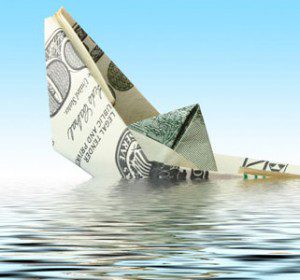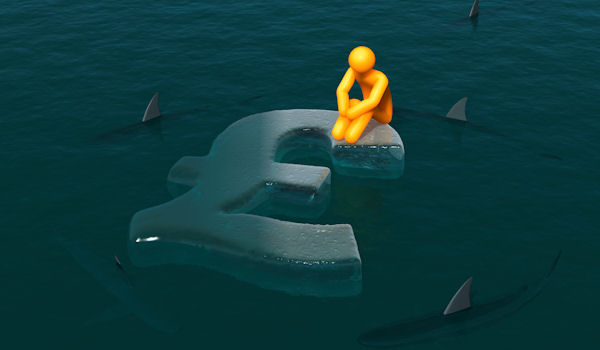What Is A Sunk Cost + What It Means To You
Sunk cost is a fascinating concept that’s been around for a while. While it’s original meaning isn’t all that exciting the implications of applying it to other areas of life is. If you’ve never heard of a sunk cost before reading this title you are far from alone. It’s not like one of those sayings you hear everyday. To be honest I can’t recall where I first read about it but it was within the last 5 years. It was in context to someone having a hard time deciding whether or not to do something. Like make a big life choice like changing a job they’d been at for 20 years. Or something similar to that. We all face decisions sometimes we feel are monumental for one reason or another. When we do it’s great to have knowledge of what is a sunk cost and what it means to you in the context of your decision. Let’s take a look at what is a sunk cost.
Sunk Cost – Defined
The term sunk cost has it’s origins in economics and accounting. Definition:
A sunk cost is any cost the has already been incurred and cannot be recovered. Sunk costs should not be considered when deciding whether or not to continue investing in an ongoing project. Only costs that will be incurred going forward should be considered when making a decision whether or not to continue a project or undertaking. Some examples might include:
A company has spent $10 million on developing a new product to take to market. Once they have the initial units ready to go they discover that nobody wants to buy any. The $10 million is a sunk cost, it cannot be recovered and should have no influence on whether to continue developing the product.
A company spends $50,000 to train their people to use a new online ordering system. Once trained it is discovered that the ordering system is unreliable and doesn’t work with their other systems. The $50,000 training cost is a sunk cost.
The Sunk Cost Fallacy
Here’s where it starts to get interesting and we can see how it applies to many areas of our lives.
 The sunk cost fallacy is when the previous cost of doing something (money, time, energy, whatever) is taken into consideration in regards to continuing to do something. To continue the project because you’ve already spent $20,000 on it. A person or an organization is more likely to continue with something that isn’t working if an investment has been made (sunk cost) even if that money is gone and it won’t come back. The higher the investment, the harder it is for a person or a company to pull the plug and move on. An investment has been made and it’s hard to walk away and try something different.
The sunk cost fallacy is when the previous cost of doing something (money, time, energy, whatever) is taken into consideration in regards to continuing to do something. To continue the project because you’ve already spent $20,000 on it. A person or an organization is more likely to continue with something that isn’t working if an investment has been made (sunk cost) even if that money is gone and it won’t come back. The higher the investment, the harder it is for a person or a company to pull the plug and move on. An investment has been made and it’s hard to walk away and try something different.
What happens here is it becomes personal to us. We feel we have to “honor” the cost that has already been paid. Part of this is done out of a fear of wasting. You and I don’t want to think that we wasted our money or our time or effort. And the more that has been invested, whether that’s time or money or something else, the more powerfully we feel that we shouldn’t have wasted it. The other part is that we don’t want to admit we are wrong. Wrong that we spent the money. Or wrong that we did something for 2 years and it’s not working. We also worry about if we are going to regret not continuing something. Like maybe if we kept doing it or spending money on it eventually it will work.
Examples of Sunk Cost Fallacy
“I’ve already watched an hour of this horrible movie, I should probably just finish it” – This applies to not just movies but reading a book or watching more than 3 episodes of a new show on Netflix. You feel since you’ve already invested the time into the movie, you should just go ahead and finish it. It might get better right? I’ve learned to simply stop watching a movie if I don’t like it within the first 20 minutes but I’ve sure watched more than my fair share of movies I should have stopped. Just because you or I started it doesn’t mean we have to finish it.
“I paid $20 for this meal, I need to finish it” – Boy oh boy how familiar is this one? I think about this one almost anytime my oldest daughter eats out with me. The reason being she orders things like lobster mac & cheese and hockey puck size scallops. And then proceeds to eat about 30% of it. And steam proceeds to pour out of my ears. The reality is if you order food but don’t finish it’s not that big a deal. The decision is made upfront to spend the money on the meal. Eat as much as you want. Don’t make yourself miserable by stuffing yourself like a Thanksgiving turkey.
“I should just go ahead and continue dating someone I don’t really like that much because I’ve invested the last year in them” – This one is super common. The longer you date some one or are with someone the harder it is to call it quits. This is especially true because it’s an emotional investment of time and energy. If you walk away after 10 years you intuitively feel like you’ve wasted 10 years. This is not really true though. You’ve already spent the time with someone, whether you leave or stay is not going to affect anything. You can’t get the time back.
“I bought my concert ticket months ago. I should go tonight even though I’ve got the flu” – See how this works? You’ve already spent the money so you feel obligated to go. Not to mention the fact you love the band and have wanted to see them for years. But if you feel terrible how much will you enjoy it? And this is the reason why we feel better if we are able to sell our tickets and get at least some of the money back.
“Since I’ve been at my terrible job for 9 years now I might as well stay for 10, I’ve already put the time in” – Again, you feel like you shouldn’t leave because you’ve already put so much time into it. But if you really don’t like your job what’s the point of staying for an extra year? Because you’ll feel bad that you didn’t make it to 10 years? There’s no real reason to.
How You Can Benefit From Letting Go of Sunk Costs
When you can look at a decision objectively and remove the sunk cost fallacy it can benefit you greatly. So now that we know what is a sunk cost and some examples let’s see how removing it can help you make decisions.
When you fall into the sunk fallacy way of thinking here’s what is happening: You are letting unrecoverable costs in the past over influence your current decisions. When you look at it objectively like that it make sense. It’s still hard to push past the invested time, money, or energy but at least thinking of it this way helps look at the situation or decision in a better light. Here’s a few tips for working to remove the sunk cost fallacy from your decision making.
Tips To Remove Sunk Cost Fallacy In Your Decisions
 Awareness – As is true in many things simply having awareness of what is a sunk cost and the sunk cost fallacy will help you from time to time. When you find yourself hesitating on making a decision ask yourself why. If it’s because you’ve already spent the money or invested the time, become aware of it. It may help you see with more clarity.
Awareness – As is true in many things simply having awareness of what is a sunk cost and the sunk cost fallacy will help you from time to time. When you find yourself hesitating on making a decision ask yourself why. If it’s because you’ve already spent the money or invested the time, become aware of it. It may help you see with more clarity.
Pretend you are your best friend – You know how your best friend can give you objective advice because he or she is on the outside looking in? Pretend you are that person. Many times a solution is so clear to another person outside of what is happening. When you are knee deep in a situation it’s hard to see it clearly sometimes. Pretend you are on the outside looking in. What would you tell your best friend if they asked if they should stick with a crappy job because they got a big bonus 2 years down the road yet they had a great offer in hand from another company?
Don’t be too hard on yourself – Remember that we all make mistakes all the time. So if you’ve been working hard on that lizard boarding business yet no one seems interested, don’t beat yourself up too bad. Probably not a great idea to keep pouring money into it but let yourself off the hook. Remember that making mistakes is how we learn. Allow yourself to move on.
Be okay with leaving the past in the past – Every moment is a new moment and then it’s in the past. That’s how time works. So to make so much of our decisions based on another decision we made in the past isn’t really the best way of doing it. Make your current decisions based on the information you have at hand. Don’t push all your chips in on a decision you made last year or 20 years ago.
Finish
Hopefully I’ve provided a decent overview of what is a sunk cost and what it means to you. It’s a fascinating(at least to me) subject and when you think about it you can see how it impacts many of our decisions. Be mindful of the costs you’ve sunk into decisions you’ve made and don’t let them weight too heavily on future decisions. No need to get too weighed down with time, money and energy previously spent. It’s over and done with. I’d love to hear your thoughts on how the sunk cost fallacy may have impacted your decisions.
All my best,
Mat A.



Wow, this is a very descriptive and great article about Sunk Cost. As an accountant, I never thought about the sunk cost fallacy as relatively personal. 🙂
I really enjoyed the article and can relate to when you started to see a bad movie on Netflix, whether you continue or not.
Or when dating someone or when you have been in your job for 9 years.
Great article and great website.
Thanks Che! Appreciate you stopping by and your comments. It’s an interesting concept and taking it from accounting to a personal day to day level is eye opening. We tend to make things so personal we don’t want to “give up” but that’s not really what we are doing. We’ve already been there and done that, it’s over. Don’t let it affect future decisions.
Good afternoon Mat,
Reading your good article I started to think if I had any “sunk costs” in my life. Yes, I found one. I used to work in an MLM for 2 years. I wrote down the money I spent and the time I worked. After 2 years I made a final account and discovered this “fun” had cost me 2000 Euros. That was the moment I decided to stop.
I do not feel bad about it as the interaction with people was fun and the products were good, I even use them now in my daily life.
It is understandable that a company which has invested big money does not always find it easy to make a new start but as the saying goes, one should not cry about spilled milk.
Regards, Taetske
Hi Taetske,
Absolutely! That’s a great example of a sunk cost. We are all simply wired in such a way as it’s hard to walk away from something we feel we’ve invested time or money or energy or all three into. Thanks!